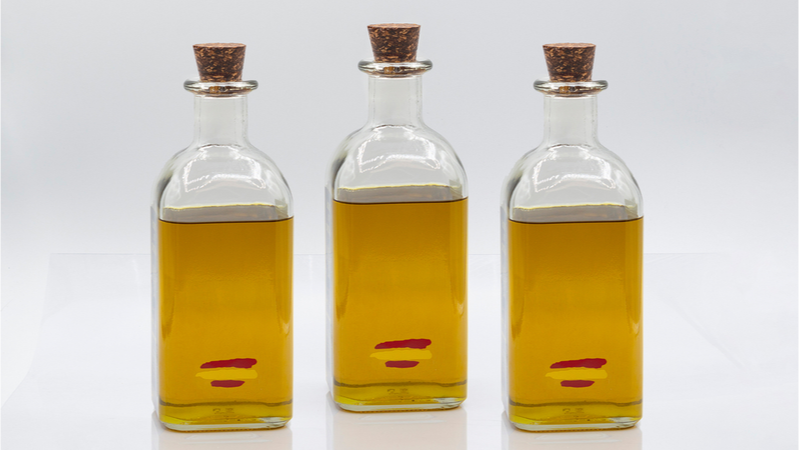In a new study published in the journal Nutritional epidemiologyscientists have found a strong association between olive oil consumption and a lower risk of cardiovascular, cancer and all-cause mortality [1].
Does olive oil prolong life?
The fact that olive oil is healthier than most other oils and fats is not exactly new. Some of the purported benefits of olive oil are backed by compelling scientific evidence. However, whether olive oil consumption affects mortality is being investigated, with data from population studies that may differ in methodology and reliability. Those studies are also being conducted primarily in countries where olive oil consumption is an integral part of a diet and it can be difficult to disentangle the effects of various components.
This population study was carried out in Spain, where the consumption of olive oil is part of the predominant Mediterranean diet. However, it does have several strengths that make it noteworthy, including its relatively long follow-up period of 18 years. The researchers also did a decent job separating olive oil consumption from other elements of the Mediterranean diet.
Robust effect on mortality
The study included 1,567 adult participants, average age 46, from the Valencia Nutrition Study. Their dietary habits were assessed at the beginning of the study through a questionnaire, and each participant was assigned a score from 0 to 7 that designated their adherence to the Mediterranean diet. The score represented nine components: fruits (including seeds and nuts), vegetables, fish, legumes, olive oil and cereals, meat, dairy, and alcohol. He obviously excluded olive oil.
The researchers also controlled for age, gender, educational level, body mass index (BMI), tobacco use, total hours of television per day as an indicator of physical activity, and the presence of pre-existing chronic diseases. such as diabetes and hypertension. .
During the follow-up period, 317 deaths were recorded, including 115 from cardiovascular disease and 82 from cancer. Compared to the baseline level of consuming olive oil less than once a month, consumption of up to one tablespoon per day was associated with a 9% lower risk of all-cause mortality. However, consuming two or more tablespoons was associated with a much greater reduction in the risk of death: 31% all-cause mortality, 46% cardiovascular mortality, and a whopping 51% from cancer. This does not mean that the effect on cardiovascular and cancer mortality appears abruptly after crossing these thresholds, but rather that in this particular study, the lower levels of consumption did not turn out to be significant.
Previous studies mostly agree
Some previous studies have failed to detect an association between olive oil consumption and mortality. However, these studies included short follow-up periods: 4.8 years for the PREDIMED study of the Spanish population [2] and only 44 months for the European Prospective Investigation into Cancer and Nutrition (EPIC)-Greek study [3]. On the other hand, the EPIC-Spain study, which had a 13-year follow-up period, found a 26% reduction in all-cause mortality for the highest levels of olive oil consumption, which is quite close to the 31% reported. in this studio [4]. This suggests that the benefits of olive oil consumption accumulate over time and can reach very significant levels.
A Harvard study published earlier this year is especially noteworthy. [5]. It has been conducted in the US rather than a Mediterranean country with a sample size of over 90,000 and an even longer follow-up period of up to 28 years. In that study, higher olive oil intake was associated with a 19% lower risk of cardiovascular mortality, a 17% lower risk of cancer mortality, a 29% lower risk of neurodegenerative mortality, and an 18% lower risk of risk of respiratory mortality.
Olive oil contains numerous compounds that could explain its health benefits, such as monounsaturated fatty acids (MUFAs). It is also rich in the phenolic compounds oleuropein, tyrosol, and hydroxytyrosol, which have been shown to possess antihypertensive, antioxidant, and anti-inflammatory qualities. Some studies also suggest that oleic acid, the most abundant MUFA in olive oil, has oncoprotective (anticancer) qualities. [6].
conclusion
This study shows a strong correlation between olive oil consumption and mortality from various causes. It doesn’t directly prove a cause-and-effect link, and people who consume significant amounts of olive oil may also have other healthy habits beyond the Mediterranean diet. Still, especially given the body of other research on this topic, it strongly suggests that regular consumption of olive oil is beneficial to health.
Literature
[1] Torres-Collado, L., García-de la Hera, M., Lopes, C., Compañ-Gabucio, LM, Oncina-Cánovas, A., Notario-Barandiaran, L., … & Vioque, J. (2022) . Olive oil consumption and all-cause, cardiovascular and cancer mortality in a Mediterranean adult population in Spain. Frontiers in Nutrition, 9.
[2] Guasch-Ferré, M., Hu, FB, Martínez-González, MA, Fitó, M., Bulló, M., Estruch, R., … & Salas-Salvadó, J. (2014). Olive oil intake and risk of cardiovascular disease and mortality in the PREDIMED Study. BMC Medicine, 12(1), 1-11.
[3] Trichopoulou, A., Costacou, T., Bamia, C., & Trichopoulos, D. (2003). Adherence to a Mediterranean diet and survival in a Greek population. New England Journal of Medicine, 348(26), 2599-2608.
[4] Buckland, G., González, CA, Agudo, A., Vilardell, M., Berenguer, A., Amiano, P., … & Moreno-Iribas, C. (2009). Adherence to the Mediterranean diet and risk of coronary heart disease in the Spanish EPIC Cohort Study. American Journal of Epidemiology, 170(12), 1518-1529.
[5] Guasch-Ferré, M., Li, Y., Willett, WC, Sun, Q., Sampson, L., Salas-Salvadó, J., … & Hu, FB (2022). Olive oil consumption and risk of total and cause-specific mortality among US adults. Journal of the American College of Cardiology, 79(2), 101-112.
[6] Giulitti, F., Petrungaro, S., Mandatori, S., Tomaipitinca, L., De Franchis, V., D’Amore, A., … & Giampietri, C. (2021). Antitumor effect of oleic acid in hepatocellular carcinoma cell lines through the reduction of autophagy. Frontiers in Cellular and Developmental Biology, 9, 629182.
.

